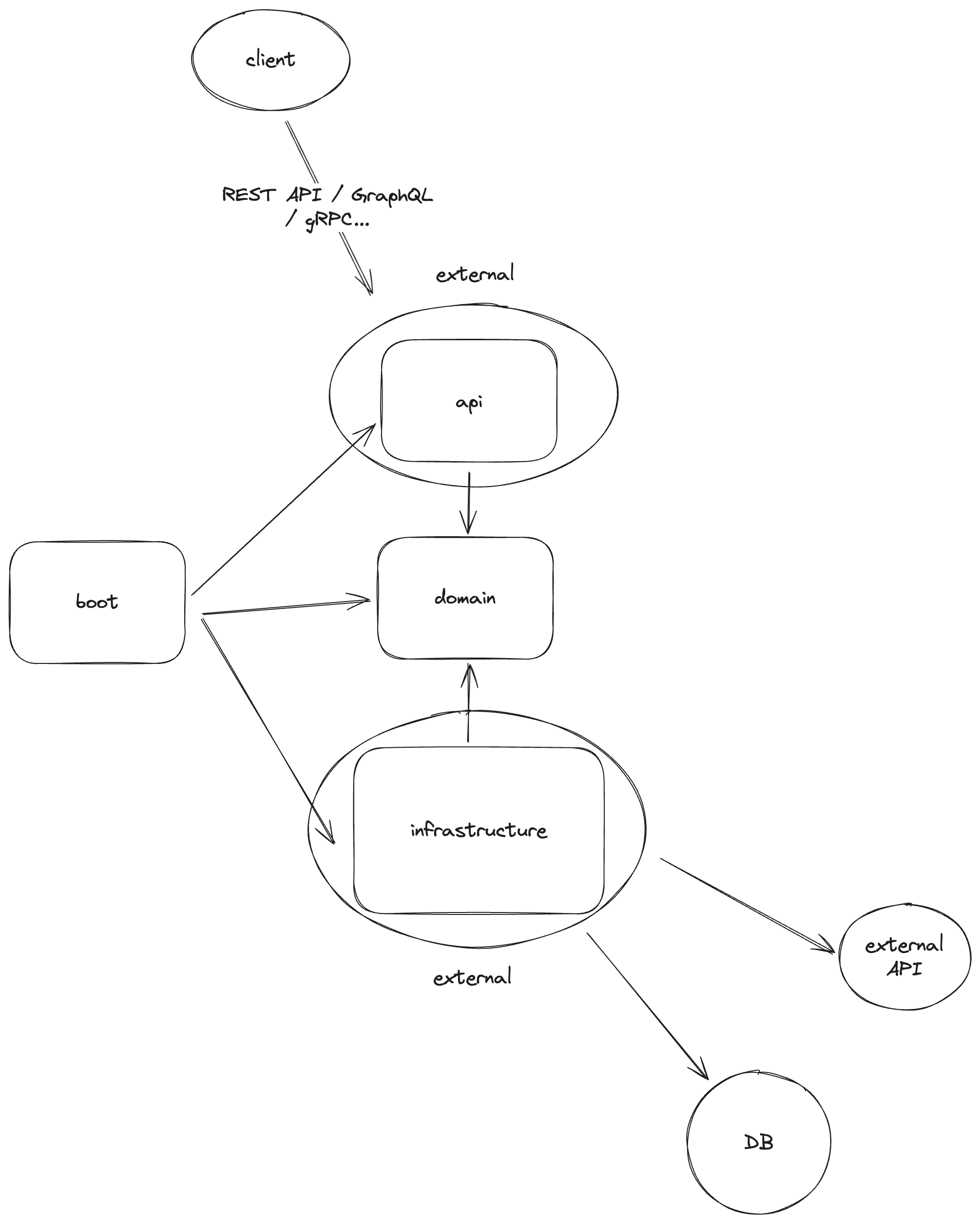해당 프로젝트의 내부 도메인 레이어(inside)는 외부 레이어(outside)와 관련없이 내부 비즈니스 모델에 집중하며 외부의 연동을 허용하기 위하여 포트(interface)를 사용합니다.
이는 일반적으로 알려진 DDD Layered Architecture, Hexagonal 의 개념을 차용 하였으며, 클라이언트의 요청과 외부 API 연동과 DB 엑세스를 위해 Application(outside) / Domain(inside) / Infrastructure(outside) 로 나누어진 레이어 구조를 가집니다.
| Main version | |
|---|---|
| Java | ^21 |
| Kotlin | ^1.9.22 |
| Docker | ^23.0.5 |
| Docker-Compose | ^2.17.3 |
서버 실행
# init 디렉토리 이동
$ cd init
# MySQL container 설치 / 실행
$ docker compose -f docker-compose.yaml -p init up -d
# root 경로 이동
$ cd ..
# 프로젝트 빌드
$ ./gradlew build
# Spring Boot 실행
$ ./gradlew :boot:bootRun멀티모듈 구조로 레이어 단위로 나뉘어져 있으며 아래 이미지와 같은 구조와 각 프로젝트별 연관 관계를 가지고 있습니다.
- boot
- 프로젝트의 진입점(실행), application yaml 설정 관리
- 모든 모듈을 참조
- api (outbound)
- Layered Architecture의 application layer 개념
- client의 요청을 받는 레이어로 gRPC 요청을 받는 grpcService 포함
- domain을 참조
- proto 디렉토리 - proto directory
- domain (inbound)
- 모델을 구성하고 모델에 대한 비즈니스 로직에만 집중
- infrastructure에 정의된 객체들을 호출하지만 직접 호출하지 않고 domain 에 정의된 interface 기반 의존성 주입
- infrastructure (outbound)
- 외부 서비스 접근을 담당하며, DB Access 를 수행
- domain을 참조
domain 모듈에서 유닛 테스트, infrastructure 모듈에서는 통합 테스트를 수행하였으며, 통합테스트를 수행하기 위해 testcontainer를 적용하였습니다.
- domain - domain layer test directory
- infrastructure - infrastructure layer test directory
전체 테스트 수행
# 모듈 전체 테스트 수행
$ ./gradlew test모듈별 테스트 수행
# domain 모듈 테스트 수행
$ ./gradlew :domain:test
# infrastructure 모듈 테스트 수행
$ ./gradlew :infrastructure:test주문 데이터를 관리하는 서버입니다. 아래 proto 파일 명세대로 구현 하였으며, 주문 관련하여 아래와 같은 기능을 제공합니다.
- 주문 등록
- 상품 추가
- 상품 제거
- 주문 완료처리
syntax = "proto3";
package org.mango.data;
option java_package = "org.mango.data";
option java_multiple_files = true;
import "google/protobuf/empty.proto";
service OrderService {
rpc CreateOrder(OrderItemRequest) returns (CreateOrderResponse);
rpc AddOrderItem(AddOrderItemRequest) returns (google.protobuf.Empty);
rpc CompleteOrder(CompleteOrderRequest) returns (google.protobuf.Empty);
rpc DeleteOrderItem(DeleteOrderItemRequest) returns (google.protobuf.Empty);
}
message OrderItemRequest {
double price = 1;
}
message CreateOrderResponse {
string id = 1;
}
message AddOrderItemRequest {
string id = 1;
OrderItemRequest orderItem = 2;
}
message CompleteOrderRequest {
string id = 1;
}
message DeleteOrderItemRequest {
string id = 1;
string orderItemId = 2;
}